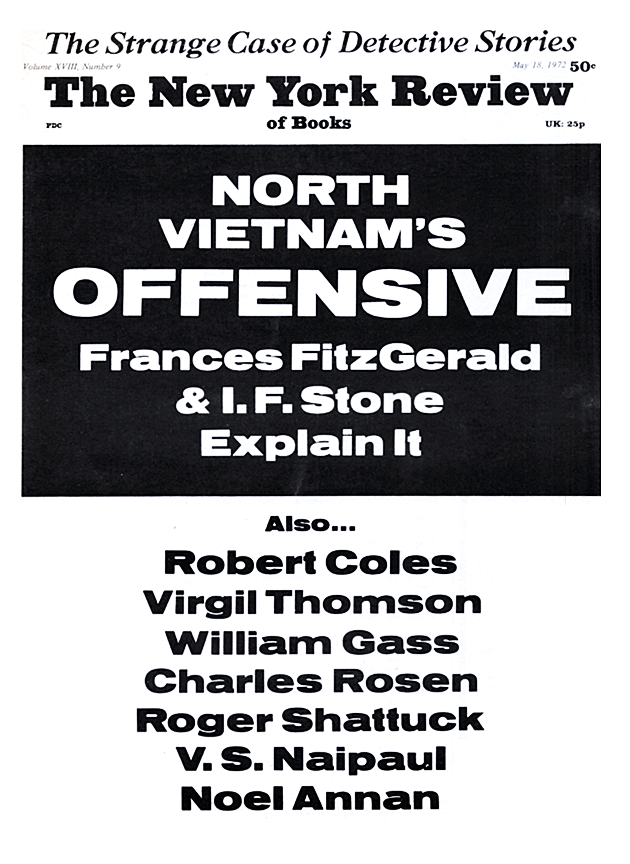In response to:
A Passage to Pakistan from the March 23, 1972 issue
To the Editors:
Your reviewer Neville Maxwell [“A Passage to Pakistan,” NYR, March 23] is back at his old stand hawking the tiresome news that India, once more, is “breaking up.” Tiresome, because Maxwell has been at it now for about two decades. He may not be the loudest in the group of writers periodically announcing India’s demise, but surely he is the most insistent. To the old Raj cliché he smugly cites, that “there is not, and never was, an India,” Maxwell seems determined to add, and, by God, there never will be….
By “breaking up” Maxwell, to be sure, means “breaking down, disintegrating, the end.” No one will ever charge him with wishing India well in its struggle for survival and nationhood. Nor does fact, historic or otherwise, deter him from his Cassandra-like prophecies—“the inevitability of it all.” Mrs. Gandhi’s sweeping victory in recent state-wide elections (70 percent of the representatives in a campaign based upon a call for national unity and a strengthening of the center, a victory which, comparable to her national electoral victory of last year, cut across caste, linguistic, and ethnic lines) will scarcely impress Maxwell. One can hear him echoing the cries of the routed West Bengal Maoist-Communists—“phony election,” “bogus Indian democracy,” “one-party regime,” etc.
Reviewing a spate of new books on India and Pakistan, some of which, at least from their titles, appear not to have the remotest connection with his pronouncement of impending doom for India, Maxwell manages however to extract from each at least one excerpt suitable to his purpose. To top matters, the clincher, he cites his compatriot Germaine Greer, who, passing through New Delhi one evening last year, announced that West Bengal is to India what East Bengal was to Pakistan! One wonders what the explanation of Ms. Greer will be when she learns of the trouncing received by the West Bengal communists at the hands of Mrs. Gandhi’s Congress Party. That is a clear repudiation precisely of any form separatism by the voters of that state.
Further, Maxwell states that India will “inevitably” fall apart (he does not hazard an opinion as to what will become of it) because of “the same centrifugal force of nationalism that destroyed Pakistan.” This statement, which implies that the two states, India and Pakistan, were built upon similar foundations and premises, is malicious nonsense. Malicious because Maxwell knows better; nonsense because false.
Pakistan, acknowledged now by all, was an artificial creation of the Jinnah-led Muslim League without a solid national base. It rested upon a deceptive “two-nation” theory (i.e., that Hindus and Muslims constituted two separate national entities incapable of living together). Held loosely together (on paper, that is) by a theocratic Islamic ideology it never evolved any significant democratic institutions. The army ruled, the army rules, as Mr. Bhutto is learning.
India, by contrast, was secular from the start. It developed a functioning constitutional structure in which relations between the states and federal center were clearly defined, the powers of the state (agriculture, education, etc.) laid down, and provisions made for settling inevitable tensions that would arise between center and state. In addition, the principle of linguistic and ethnic states was accepted and carried out. With the exception of a minority political group in Kashmir demanding union of that state with Pakistan, there is no significant political movement in all of India that wishes to opt out of the Indian union. I challenge Maxwell to name a separatist independence movement in India today. He is even wrong about Kashmir, where the real problem is not separation or independence but the demand for greater autonomy within the Indian framework, a demand which, in my opinion, has not been properly met by the central government. Has the Indian democratic structure succeeded? By and large, yes. It has survived any number of shocks and stresses, it is stronger than ever, it is operable, it is flexible. What possible contrast with Pakistan?
One knows that India has more than its share of problems. Mass poverty, the need to extend the agrarian reform, the slow progress of industrialization, caste heritage, etc. It needs the detached and critical eye of those who wish it well. I find it laughable, however, when Maxwell complains that India is “hailed” in the West by liberals and intellectuals. The truth is that the Indian way meets with contempt, disdain, and indifference among Western intellectuals, particularly those of the “left.” It is as if they are saying—you Indians fumbling around there with your democracy, your sloppy and corrupting democratic procedures (the “soft” state), don’t you know any better? Don’t you know we’ve turned our backs on all that? Mao’s way, not Gandhi or Nehru liberalism.
India will survive the ill-concealed hostility of the Maxwells. The tragedy is, however, that it will lack the useful and helpful criticism of trained, professional intellectuals who, through abstaining, add but another burden to an already impossibly heavy load.
Stanley Plastrik
New York City
This Issue
May 18, 1972


